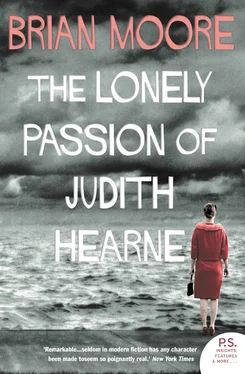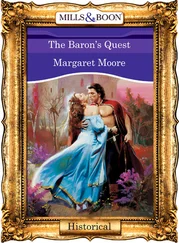‘And were you planning to teach? I mean, when your health …’
‘I’m not planning anything,’ Bernard said quietly. ‘I’m writing poetry. And I’m living with my mother.’ He smiled at Mrs Henry Rice as he said it. Mrs Henry Rice nodded her head fondly.
‘Bernard’s not like some boys,’ she said. ‘Always wanting to leave their poor mothers and take up with some woman and get married far too young. No, Bernard likes his home, don’t you, Bernie?’
‘Nobody else knows my ways as well as you, Mama,’ Bernard said softly. He turned to Miss Hearne. ‘She’s really an angel, Mama is, especially when I don’t feel well.’
Miss Hearne couldn’t think of anything to say. Something about him, so insincere. And staring at me like that, what’s the matter with me, is my skirt up? No, of course not. She tugged her skirt snug about her calves and resolutely turned the conversation towards a common denominator.
‘We’re in Saint Finbar’s here, I believe. That’s Father Quigley’s parish, isn’t it?’
‘Yes, he’s the PP. Isn’t he a caution?’
‘O, is that so? I heard he was a wonderful man,’ Miss Hearne said. ‘Goodness knows, religion is a comfort, even in conversation. If we hadn’t the priests to talk about, where would we be half the time?’
‘He’s very outspoken, I mean,’ Mrs Henry Rice corrected herself. ‘I’ll tell you a story I heard only last week. And it’s the gospel truth.’
Mrs Henry Rice paused and looked sideways at Bernard. ‘Last week,’ she said, ‘Father Quigley was offered a new Communion rail for the church from a Mrs Brady that used to keep a bad house. And do you know what he told her?’
‘What Mrs Brady would that be?’ Miss Hearne said faintly, unsure that she had heard it right. A ‘bad house’ did she say? It certainly sounded like it. Well, that sort of place shouldn’t be mentioned, let alone mentioned in connection with the Church. You read about them in books, wicked houses, and who would think there were such places, right here in Belfast. She leaned forward, her black eyes nervous, her face open and eager.
‘Well, as I said, she’s the one that ran a bad house for men over on the Old Lodge Road,’ Mrs Rice said. ‘A terrible sort of woman. So, like all those bad women, she began to get afraid when she knew her time was coming near, and she decided to go to confession and mend her ways. The house was closed up last year and she’s been a daily communicant ever since. So, a couple of weeks ago – I heard it from one of the ladies in the altar society – she went to see Father Quigley and said she wanted to present a new Communion rail to Saint Finbar’s. Wrought iron from Spain, all the finest work.’
Mrs Henry Rice paused to watch Miss Hearne’s reaction.
‘Well, I never!’ Miss Hearne said.
‘And do you know what Father Quigley said to her? He just drew himself up, such a big powerful stern man, you know what he looks like, and he said, ‘Look here, my good woman, let me ask you straight out, where did you get the money?’
‘Good heavens,’ Miss Hearne said, thrilling to every word. ‘And what did she say to that, the creature?’
‘Well, that took her back, no denying. She just fretted and fussed and finally she said she made the money in her former business. Her business , if you please. So Father Quigley just looked down at her, with that stiff look of his, and said to her, he said: “Woman,” he said, “do you think I’ll have the good people of this parish kneeling down on their bended knees to receive the Body and Blood of Jesus Christ with their elbows on the wages of sin and corruption?” That’s the very thing he said.’
‘And right too,’ Miss Hearne commented. ‘That was putting her in her place. I should think so, indeed.’
Bernard pulled the poker out of the coals and lit a cigarette against its reddened end. ‘Poor Mama,’ he said. ‘You always mix a story up. No, no, that wasn’t the way of it at all. You’ve forgotten what Mrs Brady said, right back to him.’
Mrs Henry Rice gave him a reproachful glance. ‘Never mind, Bernie. I did not forget. But I wouldn’t lower myself to repeat the insolence of a one like that Mrs Brady.’
‘But that’s the whole point,’ Bernard said, pushing the poker back among the coals. ‘Wait till I tell you her answer.’ And he leaned forward towards Miss Hearne, his white, fat face split in a smile of anti-clerical malice. His voice changed, mimicking the tones of the bad Mrs Brady.
‘She said to him: “Father, where do you think the money came from that Mary Magdalene used to anoint the feet of Our Blessed Lord? It didn’t come from selling apples,” she said. And that’s the real story about Father F. X. Quigley, if you want to know.’
When he said this, Bernard laughed. His cheeks wobbled like white pudding.
‘What a shocking disrespect for the priest,’ Miss Hearne said. Where did the ointment come from anyway? Sometimes it made you see that you should read your Douay and know it better in order to be able to give the lie to rascals like this fat lump. But for the life of her she couldn’t remember where Mary Magdalene had got the money. What matter, it was an out-and-out sin to quote Scripture to affront the priest. She put her teacup down.
‘The devil can quote Scripture to suit his purpose,’ she said.
‘Just so,’ Mrs Henry Rice agreed. ‘But what else could you expect from the likes of Mrs Brady? No decent woman would talk to her.’
‘Well – when I think of it – that hussy!’ Miss Hearne said. ‘It’s downright blasphemy, that’s what it is, saying a thing like that in connection with Our Blessed Lord. O, my goodness, that reminds me. My picture. It’s of the Sacred Heart and I always hang it up as soon as I get in a new place. I mustn’t be keeping you. The hammer.’
‘The hammer. I forgot all about it,’ Mrs Henry Rice said. ‘Now, let me think. O, I know.’
She stood up, opened the door and yelled into the hall.
‘Mary! May-ree!’
A voice called back. ‘Ye-ess!’
‘Get the hammer out of the top drawer in the dresser in the attic,’ Mrs Henry Rice bawled. She closed the door and turned back to Miss Hearne.
‘Another cup of tea before you go?’
‘O, no, really, it’s been lovely. Just perfect, thank you very much.’
‘She’s a new girl, you know,’ Mrs Henry Rice said, nodding towards the door. ‘I got her from the nuns at the convent. A good strong country girl. But they need a lot of breaking in, if you know what I mean.’
Miss Hearne, completely at home with this particular conversation, having heard it in all its combinations from her dear aunt and from her friends, said that if you got a good one it was all right, but sometimes you had a lot of trouble with them.
‘You have to be after them all the time,’ Mrs Henry Rice said, moving into the familiar groove of such talk. ‘You know, it’s a wonder the nuns don’t do more with them before they send them out to take a place. Badly trained, or not trained at all, is about the height of it.’
‘Even when these girls are trained, they’re not used to the city,’ Miss Hearne said. ‘I know the trouble friends of mine have had with convent-trained girls, taking up with soldiers and other riff-raff. Indeed, I often think the nuns are too strict. The girls behave like children as soon as …’
But she did not finish because at that moment there was a knock on the door and Mary came in. She was a tall, healthy girl with black Irish hair, blue eyes and firm breasts pushing against the white apron of her maid’s uniform. Miss Hearne looked at her and thought she would do very nicely indeed. If you were civil to these girls, they often did little odd jobs that needed doing.
Читать дальше












